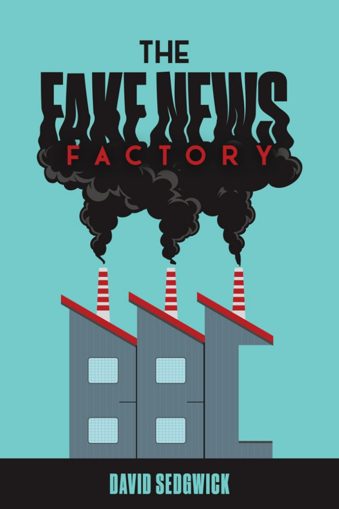
Readers of this website might have heard about my recently published critique of the BBC, ‘The Fake News Factory: Tales from BBC-land’ a fruity and occasionally witty expose of the UK’s thoroughly dishonest state propaganda machine. Released in January on Amazon, the book has received some very positive comments from the limited number of people who have actually managed to get hold of a copy. But my ode to Auntie has not gone down well in all quarters.
Certainly, the folk down at Broadcasting House, so I’m told, are not too impressed. When it comes to books that expose its tactics the BBC is not too keen, or so it seems. Who knew? As I previously noted, it had come to my attention via a third party that the good old beeb had decided to ‘sink’ my little homage to corporation – indirectly of course. This third party incidentally is a friend of a friend who works on the inside, right in the belly of the beast.
And so it came to pass. The first part of the plan unfolded when Amazon cancelled my review copies, not once, not twice but thrice. Subtle, very subtle. By ensuring that review copies reached their destinations (much, much) later rather than sooner, Bezos’ boys and girls (correctly) assumed this sly tactic would negatively impact sales, that the book would be unable to gather ‘steam’. Initial sales were indeed sluggish, well below what had been projected.
Thanks largely to plenty of social media activity and despite Amazon’s best efforts, sales picked up a little. The new book just managed to creep into the top 10 best-sellers in the company’s Media category. A trickle of positive reviews emerged. ‘Moderate’ was the word that best described the scenario.
But Amazon weren’t finished yet. Not content with having sabotaged the book’s reception, last week the consumer giant had another go. ‘Tried to order your book on Amazon yesterday and today,’ wrote a friend, ‘but it’s not available. Wow! Has it sold out?’
Books don’t ‘sell out’ on Amazon. The system is called Print On Demand (POD) which means books are printed to order. There’s no stock. While older and antiquarian books might indeed become unavailable, POD books cannot ‘sell out’ because they do not exist physically. That’s the beauty of the system. In other words, to make a book printed with Amazon unavailable requires a wilful effort to subvert the system by someone on the inside of the company.
Checking the Amazon.co.uk page I noticed with horror that my friend was right: the book was indeed showing as ‘unavailable.’ Déjà vu. I knew instantly what was going on here – namely the latest attempt to suppress sales. I made a point of checking every one of the top 50 books in Amazon’s Media category: every single one was showing as ‘available . . .’
Interestingly, having read the riot act to the company via e-mail, within the hour the book was once again ‘available’ – no apology nor explanation provided. They’d been caught out; it was a fair cop. Back to normal. However, in the 24-36 hours it had been ‘unavailable’ the book had slipped to a ranking of 150 in the Media category making it effectively invisible now to the casual browser/shopper. Amazon’s little ploy had worked a treat. I could just imagine the smirk on BBC faces.
It doesn’t end there. A social media user has just contacted me via Twitter. He’d just tried to order ‘The Fake News Factory’ without success. Did I know why the delivery date was showing up sometime in May? No, I most certainly did not! What was going on now? Coronavirus. It must have something to do with this dreaded virus. That was my thinking as I logged onto the Amazon website. It seemed possible, likely even.
Alas no. Because although both my BBC critiques (BBC: Brainwashing Britain? and The Fake News Factory) show delivery dates of 7th – 9th May, every other book in Amazon’s media category shows a delivery window of March 30th – April 6th. So, Bezos’ company has apparently decided to single out two books for especially slow service: my books. Not the BBC’s Emily Maitlis and her book ‘Airhead’ which I note will be delivered in good time, just my books . . .
Frustration, but what can one do? These tactics at the behest of the BBC are designed to do just this: frustrate. Somebody asked me – a sceptic – why Amazon would sabotage a book and thereby its own sales revenue, a chap who is presumably unaware that Amazon’s CEO happens to be the world’s richest person – with or without his percent of my own modest earnings.
Somebody else suggested I should crowdfund a legal case, David v Goliath. Hmmm . . . months and months of stress, a life put on hold and to what end? For the well-paid corporate proxies of Bezos and his BBC allies to demonstrate that justice has a price that is supposed to put it beyond the reach of the little people? The system favours the rich and powerful, I thought everyone knew that.
Instead I’ll content myself the only way possible: by exposing the practices of this monster corporation; by boycotting its products and hoping others will follow suit. Some of Bezos’ minions have effectively trashed my livelihood and can do the same to any of us anytime they like. The thought that a spotty silicone cyber-geek with Asperger’s has such power over our lives should worry each and every one of us. But will it? I doubt it.
Facebook, Google, Amazon, Starbucks, BBC, Sky . . . if this is our future, then God help us.
David Sedgwick’s book, ‘The Fake News Factory: Tales from BBC-land’ is published on Amazon.
© David Sedgwick 2020
David’s books on Amazon
The Goodnight Vienna Audio file



